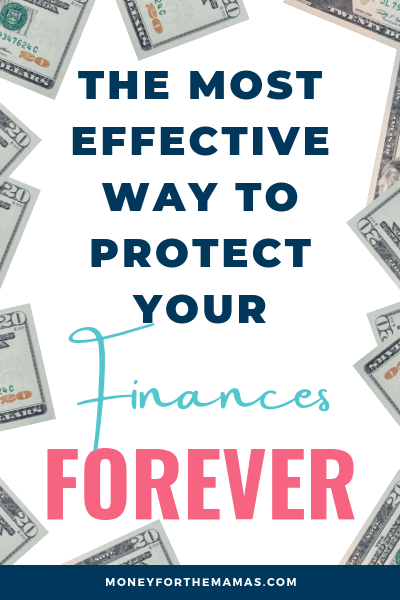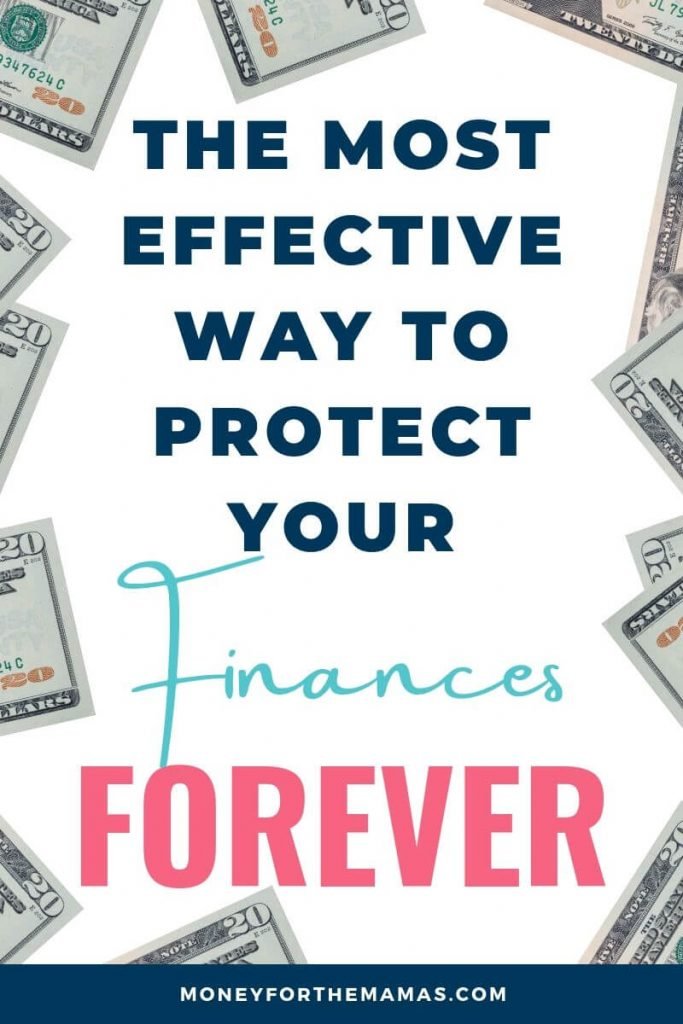Should I Freeze My Credit? Absolutely, and Here’s Why & How!
The most effective way to protect you (and your loved ones), here’s how to set up a credit freeze

Author: Kari Lorz – Certified Financial Education Instructor
Something that used to freak me out but doesn’t anymore is when my personal data gets compromised in a data breach.
Target Corporation in 2015 sent Moms into a tailspin, Equifax’s huge one in 2017 compromised the data of 146 million people, and Capital One’s data breach in July of 2019 was 100 million customers.
I was one of those customers, and honestly, I didn’t even really care. It was lame, yes, but I didn’t freak out at all. Why? Because I added a credit freeze onto my info years ago! I’ll walk you through how to set up your own credit freeze.

This post may contain affiliate links. If you make a purchase, I may make a commission at no cost to you. Please read my full disclosure for more info
What is so bad if my personal data gets stolen?
- They could open up credit accounts in your name, run up the bills, and vanish. You’re then stuck with the balance, trying to fight the charges. What’s worse is that you may not even know it’s happening until credit card companies start calling you or sending you to collections.
Trying to clean up this mess could take years, and you could face much higher interest rates in the meantime. - Your email and website logins are at risk. Your address, name, and SSN could be combined with data from your workplace, name, email, and personal email and accounts, and all turned into one file.
For example, Dropbox was breached in 2012 using credentials stolen in the LinkedIn data breach earlier that year. If you used your password for one account, then you likely use it for multiple accounts.
Overall, know that your data will be sold to whoever will pay for it. They could sell it hundreds of times, and it could be used for whatever the buyer wants with it. Oh, the possibilities?
If your info has been compromised, and you monitor your accounts for a few weeks. Yet, it all looks well, don’t think that it’s all over. Your data could be sold again a week after that, so be sure you change your passwords.
What does it mean to “freeze your credit”?
It’s also called a security freeze too, basically, you are telling the credit reporting agency (there are three) that you don’t want anyone to be able to open a credit account in your name, ever! Unless you of course personally unfreeze it.
I did this probably about five years ago, just one of the things that I did to simplify my finances.
Just like it sounds, it prevents anyone from opening credit accounts. Even if they have your social security number, as your account can only be unfrozen with a special login, password(s), and PIN.
Now, this won’t protect your existing accounts that are already open or current bank accounts. (see below on how to protect an existing account).
How do you set up a security freeze?
Call each of the three bureaus or go online and fill out the forms for a freeze request.
Equifax
Equifax.com/personal/credit-report-services
800-685-1111
Experian
Experian.com/help
888-EXPERIAN (888-397-3742)
Transunion
TransUnion.com/credit-help
888-909-8872
With each of the three bureaus, they may give you different credentials to be able to go in and manage your credit freeze. You will use:
- Login email
- User name
- Password
- Personal identification number – PIN
Keep these in a VERY safe spot! Yes, you can use LastPass for this. You will need this info if you want to lift your credit freeze to apply for any new accounts…
- Credit cards
- Car loan
- Home loan/mortgage
- Oddly enough, they run credit reports for new cell phones
You can either lift your credit freeze permanently, or you can lift it for a specific time or for a particular lender. Keep in mind that if you want to lift your freeze temporarily, it will take maybe 30 min to 1 hr for it to take effect.
If you do want to open a new credit account, ask the lender/creditor beforehand which bureau they do their credit check with. Some places pull from one bureau, and some places pull from all three.
Yes, it’s kind of annoying to do this. Trust me; it’s much less annoying than having to clean up your credit report.
This is the perfect example of “adulting.” Boring, tedious, but vital stuff to take care of.
What do I do if I lost my PIN?
You can request a new pin, either by online, calling, or by mail. Yup, by slooooooow mail. You may have to provide documentation and jump through some hoops, but it can be done. It’s best (of course) when you get your credentials to store them somewhere safe immediately.
There is no greater wealth in this world than peace of mind
unknown
Protecting our loved ones from identity theft
Protecting your children
Now, I know this sounds a tad bit extreme, but adults aren’t the only ones subject to having their info stolen and used nefariously. There have been quite a few times where minors have had their info stolen and their credit report ruined. In fact, Experian notes that there were almost 14,000 complaints of child & teen identity theft in 2017 (source).
I hate to say it, but devious family members are usually the culprit. So if you have someone in your home whom may not be trustworthy then please freeze your credit now.
I have had personal experience with this, as my college boyfriend would get calls from collectors frequently. All because his mother had opened accounts in his name, and she was late paying. YIKES!
Equifax – Parents, legal guardians, or others with Power of Attorney can place a security freeze on the Equifax credit reports of minors under the age of 16.
Experian – it simply states that you can do this for a minor, age 13 and up.
TransUnion – you can freeze the credit of your spouse or a minor 15 yrs and younger.
Protecting your elders
You can also freeze someone’s credit whom you hold Power of Attorney for. For example, an aging relative in a nursing home. Whom they may want to open accounts, or be under duress from facility staff to open. Yes, that’s drastic I know, but sad to say is that it happens. The elderly are very often considered easy victims.
“The FTC also reported that 35% of fraud complaints and 18.9% of ID theft complaints impacted seniors (Americans who are 60 years or older) in 2017.” (source)

How do I know if I’ve been a victim of identity theft?
Even if you don’t have creditors calling you, that doesn’t mean you’re safe. Your info could have been recently compromised. You should pull your credit reports to see.
By law, you are granted one free report from each of the three bureaus per year. Go to the Annual Credit Report site and request your free annual credit report. I would pull one now, use a different one in four months, and then another one four months after that.
Remember that your credit report is different than your credit score. So if you have a good score, that means that you have a good score right this minute. But things show up on your credit report and then, after that, affect your score.
It typically takes three months for the majority of people to find out they have been victims of identity theft, according to the ITRC’s Aftermath Study. However, according to the same report, 16% of people didn’t find out for three years, probably when they were contacted by a collection agency.
How can I protect myself from identity theft?
One – have strong & unique passwords
Store Your passwords correctly! Password overwhelm? Try LastPass, they store all your login info and passwords in their database, and you can access with one primary password.
Now, I know this sounds risky, but security is their thing. They built their entire business around this. To read how they encrypt data check out this post. Now, the key is don’t use your LastPass password for anything else! Ever!
Don’t give out your information to anyone! In this day and age, no one who reaches out to you needs your info (unless you know this person well). For example, yes your doctor’s office needs your SSN for insurance.
But strangers who call you asking for any info (it doesn’t matter how innocently it sounds) don’t need it. Even if they ask for your last name, just hang up on them.
Remember, they can compile little bits of info here and there to come up with a whole and complete profile on you! To decrease the number of calls you get, register your phone number on the National Do Not Call Registry.
Yes, this is mostly for telemarketers, but the fewer places your number is, the better! (note: it takes 30 days to go into full effect once you register your phone number) .
Two – Clean up after yourself
Shred your documents – anything that has personal info (beyond your name and address) just shred it! Need a shredder?
- Cross cut shredder turns paper into small pieces (0.2 x 1.9 inches; 5 x 47 mm); meets security level P-3 standards
Three – Opt out of all information sharing and pre-approvals
Opt-out of pre-approved credit offers – Yes, you can decrease your junk mail and help protect yourself at the same time! Just go to OptOutPresereen and remove yourself from their offer database.
Oddly enough, “Under the Fair Credit Reporting Act (FCRA), the Consumer Credit Reporting Companies are permitted to include your name on lists used by creditors or insurers to make firm offers of credit or insurance that are not initiated by you (“Firm Offers”).”
You can opt out of sharing personal information for five years via their website or mail in a form to permanently opt out. Your request will become effective in 5 days with the credit bureau, but your info may already be on current mailing lists. So you may still receive offers for a few more months and then dwindle after that.
The most important thing you can do to protect your finances is to freeze your credit! (whew, we finally made it back to the main topic!)
Is a credit freeze different than a fraud alert?
Fraud alert – You can place a warning on your credit record that tells lenders to contact you and verify your identity before extending new credit. You will know about this because they will call you to verify the new account opening.
Extended fraud alert – “An extended fraud alert means that the credit issuer must verify your identity before it issues new credit. An extended fraud alert, lasting seven years, is available only to identity theft victims. To get an extended fraud alert, you’ll first need an Identity Theft Report, which you can create at IdentityTheft.gov .” (source)
If a credit freeze seems too “final” for you then definitely do a fraud alert. But remember it will only last a year. To set this up, you need to call one of the credit agencies and ask them to place an alert on your info. They will then notify the other two bureaus.
What is a credit lock?
A credit “lock” is usually a program offered by either one of the bureaus as a paid service for people. You can usually lift the Credit lock immediately online. Yes, there’s a phone app for that.
Is paying for this service and having them monitor it better? No.
You don’t need to pay for this, nor should you have someone else be in charge of this for you through a paid credit monitoring service. There are some things in life that we as adults need to be in control of ourselves. You need to understand this process and be actively involved. Once you farm it out, you are disconnected from it, and with something this important, it should be you to handle it.
Besides, their offerings aren’t that amazing, and you can get all the info provided by doing some of the legwork yourself.
How much does it cost to freeze my credit?
It’s free! In 2018 Congress passed a law to make it free, and then a few months later, all States put it into legislation. Previous to this (the Equifax breach brought this on), it would cost anywhere from 43 to $12 to place/lift a freeze.
On the same note, placing a freeze on your info does not affect your credit score. So no worries there.
Why wouldn’t I want to do a credit freeze?
If you are consistently opening new credit accounts, it may not be a good time to freeze your credit. Such as if you are buying & furnishing a new home, or setting up new accounts. Maybe you should just do a freeze lift for six months or so.
How do I protect the accounts that I already have open?
Set up credit card alerts – With most cards, you can set up automatic alerts, where if a purchase comes through that you have already set alerts around, then you will be notified immediately (typically by email).
For example, on one of my cards, I get email alerts for any purchase over $200.00 (you decide the threshold amount). I also have it set to alert for any purchases outside the US.
You can also get an alert if there have been any changes made to your account profile by mail, phone, or email. (aka if someone logs in and changes your contact info).
With these alerts, one or two transactions may go through, but you can catch it pretty quickly and call in, cancel your card, and then dispute those charges.
Don’t use your card in places that you don’t feel are reputable. For example, if I have to get gas at a really sketchy, random station, I always carry $50 cash in my car. Or just this past month, we went to the State Fair, and we brought cash. Buying a turkey leg from a carnival stand with your credit card could have more dire consequences than the potential food poisoning. Just saying.
What to do if you are the victim of identity theft
Whatever you do, do it NOW! Waiting and avoiding this situation will only escalate the damage.
If you want a generic recovery plan go to the FTC’s Consumer Information page and scroll to the last section (almost to the bottom), and look for “Download and order printed copies” to download a free recovery plan
Then immediately go to the Federal Trade Commission reporting page and file a report!
Action plan to safeguard your information
- Pull your 1st free credit report
- Mark on your calendar to pull the next one in four months, then the other bureau four months after that
- Scan over your report looking for errors (if found errors and believe to be a victim of identity theft, file a report.
- Freeze your credit with each of the three bureaus
- Freeze your spouse’s
- Consider freezing accounts for your children or at-risk aging loved ones.
- Opt-out of telemarkets and prescreen offers
- Get a good shredder, shred sensitive info (anything above & beyond name & address)
At the end of the day
As I said at the very beginning of this post, there’s A LOT to be said for peace of mind. A security freeze won’t protect you from everything if your data becomes compromised. BUT it will protect you against the main pitfall (aka ruined credit report).
Also, protecting your loved ones (aging parents and/or children) is a huge benefit. Remember, it may take you 30 minutes to freeze your credit with the three bureaus. Or it could take you years and years to clean up your damaged credit file. You decide.
Articles relating to freezing your credit:
- Are You Throwing Away Your Money on Credit Card Interest Rate Fees?
- 31 Days of Financial Goals to Jumpstart Your Finances
- How to Kick Your Financial Stress to the Curb!
- 6 Easy Steps for A Simpler Financial Life





Great post! I have been a victim of credit fraud a few times, luckily my bank reversed all charges immediately. But I have never heard of it thought of doing a credit freeze! Thanks for all the great info, as always!
I’m so sorry you had to go through that, but your bank sounds like they really took care of you! So nice when businesses have your back!
Credit card theft is the worse. My husband has been a victim of this and we are very careful after that. It is such a pain. Great tips.
I’m so sorry you had to go through this, it’s such a pain, and being a victim is never a good feeling!
Great post Kari! A lot of helpful insights and glad you emphasize this important aspect of protecting your personal information. It is never 100% but if I can safeguard my data 95% I’ll still take that vs. 0% Thanks!
Absolutely! I’ll totally take 95% protected too!
Great information! Didn’t know you could freeze your credit. Thanks for sharing.
So glad you found it helpful!
Hi Kari, this is such valuable information. I’ve been meaning to freeze my credit but keep forgetting. Thanks for the reminder.
DeShena I always need reminders! 🙂 Happy to help!